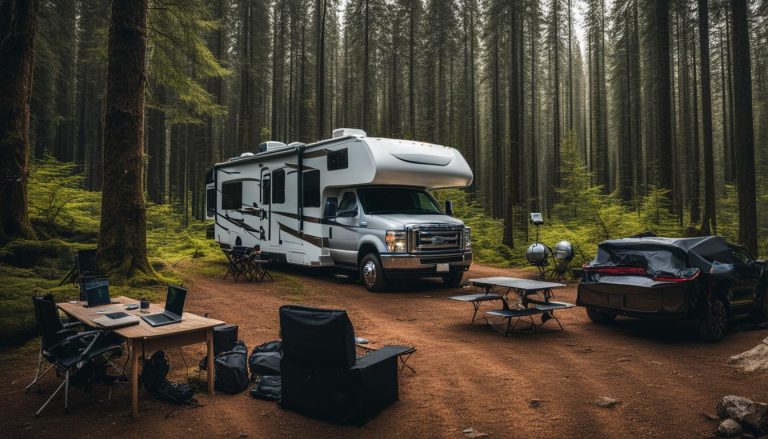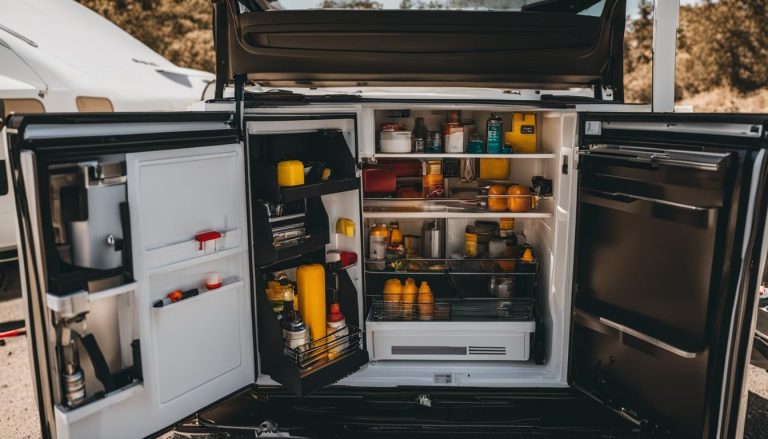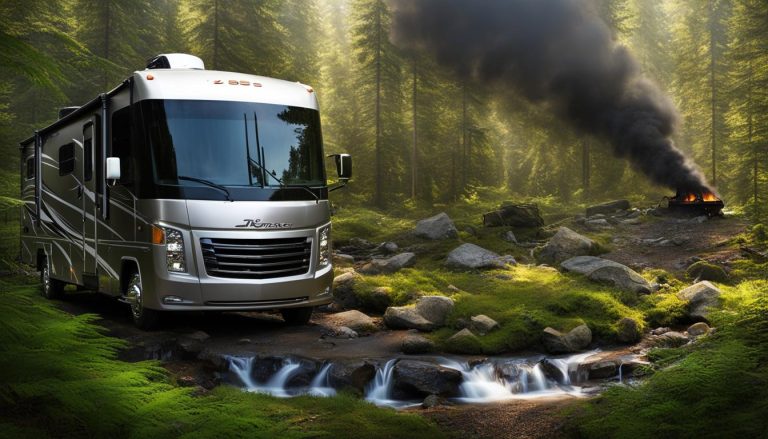RV Internet Tips: Stay Connected on the Road
gorvlifestyle.com and its partners may earn a commission if you purchase a product through one of our links
When you’re hitting the road in your RV, staying connected to the internet is more important than ever. Whether you’re a digital nomad, enjoy streaming your favorite shows, or need to keep in touch with family and friends, having reliable internet access is crucial. In this article, we’ll explore various RV internet options, from mobile internet solutions to WiFi connectivity in an RV, to help you stay connected while RVing.
Key Takeaways:
- Choose the right RV internet solution based on your data needs, travel destinations, and budget.
- Understand the different options available, such as cellular data, campground WiFi, satellite internet, and more.
- Consider installing WiFi boosters or repeaters to optimize your RV internet setup.
- Manage your data usage and select the appropriate data plan for your needs.
- Prepare for potential dead spots and have backup options in case your primary internet source fails.
Understanding RV WiFi
RV WiFi works just like WiFi anywhere else. It allows you to connect your WiFi-enabled devices to the internet. However, the original signal for RV WiFi comes from different sources, such as cellular data or a local WiFi network. Understanding the different options and terms associated with RV WiFi is essential for choosing the right solution for your needs.
When it comes to RV WiFi, there are a few key terms you should be familiar with:
- RV WiFi: Refers to the internet connectivity in your RV, allowing you to access the internet on your devices.
- WiFi in an RV: Describes the ability to connect to a wireless network while inside your RV.
- RV WiFi solution: This refers to the method or technology you choose to establish a WiFi connection in your RV.
- WiFi terms: These are the technical terms and concepts related to WiFi, such as signal strength, bandwidth, encryption, and network protocols.
By familiarizing yourself with these terms and understanding how RV WiFi works, you’ll be better equipped to select the most suitable solution for your RV internet needs.
Cellular Data for RV Internet
When it comes to RV internet, cellular data is a popular and reliable option for staying connected on the road. With cellular data, you can access the internet using your smartphone as a mobile hotspot or invest in a dedicated mobile hotspot device.
Using a mobile hotspot allows you to create a WiFi network within your RV, enabling you to connect multiple devices to the internet simultaneously. This is particularly useful when you have multiple family members or devices that require internet access.
One important consideration when using cellular data is selecting the right data plan. Different carriers offer various data plans that cater to different usage needs. It’s crucial to choose a plan that suits your data requirements, ensuring you have enough data for browsing, streaming, and other online activities.
In addition, it’s worth noting that in some remote areas, cellular signals may be weak, leading to slow internet speeds or connection drops. This is where a cellular booster can come in handy. A cellular booster amplifies the existing cellular signal, helping to improve your internet connection even in areas with poor signal strength.
Overall, utilizing cellular data for your RV internet needs provides flexibility, convenience, and reliable connectivity. Whether you opt for a mobile hotspot or invest in a dedicated device, ensure you choose the right data plan and consider a cellular booster for optimal internet performance.
Comparing Data Plans
| Data Plan | Monthly Cost | Data Allowance | Additional Features |
|---|---|---|---|
| Carrier A | $50 | 30GB | Unlimited talk and text |
| Carrier B | $70 | 50GB | Hotspot included |
| Carrier C | $80 | Unlimited | HD streaming |
Comparing data plans can help you find the best option for your RV internet needs. Consider factors such as monthly cost, data allowance, and additional features when making your decision.
Campground WiFi and Other Public Networks
When you’re out exploring the great outdoors in your RV, staying connected can be important for work, communication, or simply entertainment. While campgrounds often provide WiFi for guests, the quality and speed can vary. Similarly, public locations like coffee shops may also offer WiFi, but these networks can often be crowded and slow.
To enhance your WiFi connection and ensure a reliable internet experience within your RV, consider utilizing WiFi signal boosters or extenders. These devices amplify the existing WiFi signals, allowing you to maintain a stronger and more stable connection. With improved signal strength, you can browse the web, stream videos, and stay connected with ease, no matter where you are.
One popular option for boosting WiFi signals is the WiFiRanger EliteAC Pack, which includes a WiFi booster and router. This device can significantly enhance the range and strength of the WiFi signal, ensuring a faster and more reliable connection throughout your RV.
“Having a WiFi signal booster has been a game-changer for our RV adventures. We can now enjoy reliable internet access even in remote campgrounds with weak signals.”
– Jennifer, Full-time RVer
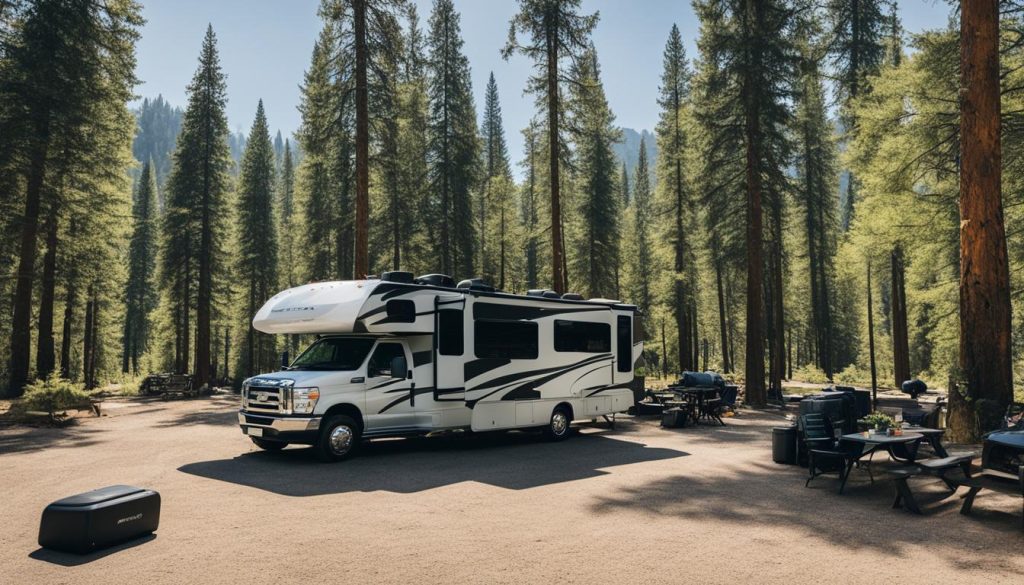
In addition to signal boosters, there are other strategies you can employ to improve your overall WiFi experience. Positioning your RV closer to the WiFi source, minimizing physical obstructions, and ensuring your devices are updated with the latest WiFi protocols can all contribute to a better connection.
By optimizing your campground WiFi and utilizing WiFi signal boosters, you can stay connected and enjoy the benefits of the internet while on the road. Whether you’re checking emails, browsing social media, or streaming your favorite shows, a reliable WiFi connection ensures a seamless experience throughout your RV travels.
Satellite Internet for Remote Areas
If you love RVing and frequently find yourself exploring remote areas with limited cellular coverage, satellite internet is the perfect solution to keep you connected. With satellite internet, you can stay connected and enjoy all the conveniences of the online world no matter where your travels take you.
To access satellite internet in your RV, the first step is to install a satellite dish on the roof. This dish receives signals from satellites in space, allowing you to send and receive data. Once installed, your satellite dish acts as a reliable connection point, ensuring uninterrupted internet access in even the most remote locations.
While satellite internet plans may be slightly more expensive compared to other options, they offer unparalleled coverage and reliability in remote areas. With satellite internet, you won’t have to worry about cellular dead zones or relying on unreliable public WiFi networks.
To help you understand the benefits of satellite internet for RVing, here’s a breakdown of its key advantages:
| Advantages of Satellite Internet for RVers | |
|---|---|
| 1. Wide Coverage | Satellite internet provides coverage in remote areas where other options may not be available. |
| 2. Reliable Connection | With a dedicated satellite dish, you can enjoy a stable and consistent internet connection. |
| 3. Unlimited Data | Many satellite internet plans offer unlimited data, allowing you to browse, stream, and download without worrying about data caps. |
| 4. Flexibility | Satellite internet plans can be tailored to your specific needs, whether you’re a casual web surfer or require more bandwidth for work or entertainment. |
With satellite internet, you can stay connected while immersing yourself in nature’s beauty. No matter how remote the location, you can enjoy the comforts of modern connectivity in your RV.
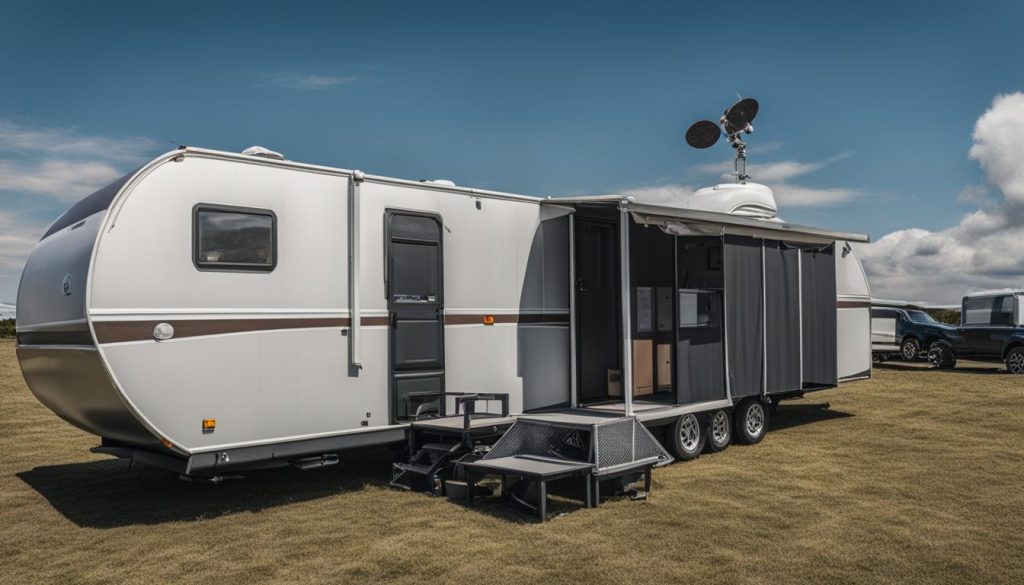
Choosing the Right RV Internet Solution
When it comes to selecting the ideal RV internet solution for your travel adventures, several factors should be taken into consideration. Your data needs, travel destinations, and budget will play a crucial role in determining the best internet option for your RV. By evaluating the pros and cons of each choice and considering a combination of solutions, you can ensure optimal connectivity throughout your journey.
Start by researching different RV internet options available in the market. This includes cellular data plans, satellite internet, and campground WiFi. Take the time to read customer reviews and compare coverage maps to make an informed decision. Remember, the choice of your RV internet solution can greatly impact your overall travel experience.
If you require reliable internet access in remote areas or places with limited cellular coverage, satellite internet may be the best choice for you. Installing a satellite dish on top of your RV will enable you to establish a connection with satellites in space, ensuring consistent internet connectivity wherever you go.
On the other hand, if you prefer the convenience of cellular data, consider investing in a mobile hotspot or utilizing your smartphone as a personal hotspot. Different carriers offer various data plans, so choose the one that aligns with your data needs and budget. For areas with weaker cellular signals, a cellular booster can help amplify the signal and improve your connection.
Additionally, campground WiFi can be a cost-effective option, especially if you frequently stay at campgrounds or RV parks. However, keep in mind that the quality and speed of campground WiFi can vary, and it’s always a good idea to have a backup internet option to rely on.
By carefully assessing your requirements and researching the available options, you can select the best internet solution for RV travel. Remember to prioritize reliable connectivity, as staying connected on the road is essential for work, staying in touch with loved ones, and enjoying streaming entertainment during your RV adventures.
Stay tuned for the next section where we will provide tips for optimizing your RV internet setup.
Tips for Optimal RV Internet Setup
When it comes to staying connected on your RV adventures, optimizing your internet setup is essential. Here are some tips to help you make the most of your RV internet and ensure a smooth online experience.
Boost Your WiFi Signal
Installing WiFi boosters or repeaters in your RV can greatly improve the strength and range of your WiFi signal. These devices amplify and extend the reach of your WiFi, allowing you to stay connected even when you’re farther away from the source. With a boosted signal, you can enjoy faster internet speeds and a more reliable connection throughout your RV.
Manage Your Data Usage
Managing your data usage is crucial to avoid running out of data and incurring extra fees. Start by selecting the appropriate data plan that aligns with your internet needs. Consider factors such as the number of devices connected, your streaming habits, and the amount of data you typically consume. Monitoring your data usage regularly can help you identify any excessive or unnecessary usage and adjust your browsing habits accordingly.
Consider Additional Devices and Services
Explore optional devices and services that can enhance your RV internet experience. One such device is a cellular router, which acts as a bridge between your RV and the cellular network, providing a more reliable and secure connection. Specialty providers, like those catering specifically to RVers, may offer unique solutions and services tailored to optimize your internet connectivity on the road.
Have Backup Options
Even with the most robust internet setup, there can still be instances where your primary internet source fails. It’s important to have backup options to ensure uninterrupted connectivity. This could include having a secondary cellular carrier or a portable WiFi hotspot device as a backup for when your main connection is unavailable. Having a backup plan will give you peace of mind, especially during critical online tasks or emergencies.
By implementing these tips, you can enhance your RV internet setup and enjoy a seamless online experience while exploring the great outdoors. Stay connected, stay informed, and make the most of your RV adventures!
Staying Connected on the Road
When you’re RVing, staying connected is essential for work, keeping in touch with loved ones, and accessing entertainment. Luckily, there are several options to ensure internet access on the road in an RV. Whether you choose to rely on cellular data, campground WiFi, satellite internet, or a combination of these options, prioritizing reliable connectivity is key to a smooth and enjoyable travel experience.
To stay connected while RVing, it’s important to plan ahead. Research the coverage and availability of different internet options in the areas you’ll be traveling to. This will help you determine the best solution for your needs. Keep in mind that certain remote areas may have limited or no coverage, so having a backup option like satellite internet can be beneficial.
Another crucial aspect of staying connected is monitoring signal strength. Use signal boosters or extenders to improve WiFi signals within your RV. This will help you maintain a strong connection even in areas with weak signals. Additionally, consider data usage management. Choose the appropriate data plan for your needs and monitor your consumption to avoid unexpected overage charges.
By taking the time to plan ahead, monitor signal strength, and manage data usage, you can ensure reliable internet access on the road in your RV. Stay connected, work remotely, stay in touch with loved ones, and enjoy your favorite entertainment while exploring the beauty of the open road.
FAQ
What is RV WiFi?
RV WiFi allows you to connect your WiFi-enabled devices to the internet while on the road in your RV. The original signal for RV WiFi comes from sources such as cellular data or a local WiFi network.
How can I get internet in my RV?
There are several options for getting internet in your RV. You can use cellular data by turning your smartphone into a mobile hotspot or investing in a dedicated mobile hotspot device. You can also connect to WiFi networks available at campgrounds or other public locations. Additionally, satellite internet is an option for remote areas with limited cellular coverage.
What are some terms I should know about RV WiFi?
Some terms to familiarize yourself with include cellular data, mobile hotspots, data plans, WiFi boosters, WiFi signal extenders, and satellite internet. Understanding these terms will help you navigate and choose the right RV WiFi solution for your needs.
How does cellular data work for RV internet?
Cellular data for RV internet involves using your smartphone as a mobile hotspot or investing in a dedicated mobile hotspot device. Different carriers offer data plans that you can choose from. You can also improve your cellular data connection with a cellular booster in areas with weak signals.
Can I connect to WiFi networks at campgrounds and other public locations?
Yes, many campgrounds provide WiFi for guests, although the quality and speed can vary. You can also find WiFi networks at public locations like coffee shops. However, these networks may be crowded and slow. To improve your WiFi connection within your RV, you can use WiFi signal boosters or extenders.
What is satellite internet, and is it available for RVers?
Satellite internet is an option for RVers who travel to remote areas with limited cellular coverage. It involves installing a satellite dish on your RV to send and receive signals from space. Satellite internet plans can be more expensive than other options and may have specific equipment requirements, but they ensure connectivity in places where other options may not be available.
How do I choose the right RV internet solution?
When choosing an RV internet solution, consider factors such as your data needs, travel destinations, and budget. Evaluate the pros and cons of each option, and determine whether you need a combination of different solutions for optimal connectivity. Research service providers, read customer reviews, and compare coverage maps to make an informed decision.
How can I optimize my RV internet setup?
To optimize your RV internet setup, consider installing WiFi boosters or repeaters to improve signal strength. Manage your data usage by selecting the appropriate data plan and monitoring your consumption. Explore optional devices and services, such as cellular routers or specialty providers, for enhanced connectivity. It’s also important to have backup options in case your primary internet source fails.
How can I stay connected while RVing?
Staying connected while RVing allows you to work remotely, stay connected with loved ones, and access entertainment. Whether you choose cellular data, campground WiFi, satellite internet, or a combination of options, prioritize reliable connectivity by planning ahead, monitoring signal strength, and preparing for potential dead spots. With the right RV internet setup, you can stay connected and enjoy your travels.



